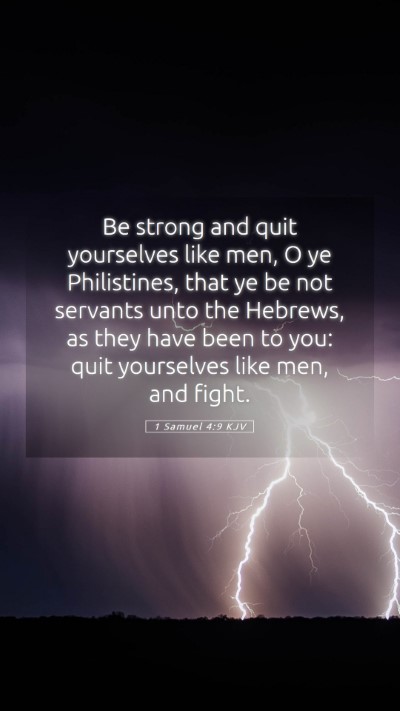Understanding 1 Samuel 4:9
1 Samuel 4:9 states, "Be strong and conduct yourselves like men, you Philistines, that you do not become servants of the Hebrews, as they have been to you. Conduct yourselves like men, and fight!" This verse emerges from a critical moment during the Philistine attack against Israel. The significance of this exhortation is profound, urging the Philistines to muster their strength and courage in the face of impending battle.
Bible Verse Meanings
This call to action is pivotal for understanding the broader narrative in 1 Samuel. The Philistines were at a crossroads where their identity and strength were tested. Matthew Henry's commentary emphasizes that this directive reflects a moment of desperation and the necessity of resolve in the conflict. The phrase "conduct yourselves like men" suggests a rallying call for bravery and fortitude, contrasting the fearful state they could fall into if they hesitated.
Bible Verse Interpretations
According to Albert Barnes, this verse reveals the cultural expectations of masculinity in the ancient Near East, where men were expected to show bravery in battle. The encouragement to "fight" serves as a stark reminder of the responsibilities that warrior cultures placed on their men, especially in times of crisis. This understanding helps readers analyze the cultural context and the weight of these words.
Bible Verse Explanations
Adam Clarke provides insights into the historical backdrop of this verse, pointing out that the Philistines were aware of Israel’s past victories and the divine assistance that often accompanied them. To be defeated would not only mean military loss but also humiliation and enslavement. Thus, this exhortation was not only practical, urging them to fight, but also psychological, playing on their fear of being subjugated.
Scripture Analysis
The exhortation in 1 Samuel 4:9 can also be seen as a reflection of the human condition—facing fear and uncertainty in critical moments. It invites readers to consider the courage required to confront challenges in life, making this verse relevant beyond its immediate context.
Biblical Exegesis
The term "be strong" is a recurring theme in the Bible, often linked with divine strength (e.g., Joshua 1:6-9). This connection is vital for understanding the underlying message of resilience and faith amid fear. The Philistines, unlike Israel, did not have the same covenant relationship with God, impacting their approach to courage and strength.
Bible Study Insights
For those engaged in Bible study groups or online Bible study, exploring the context of this verse provides a gateway to discuss themes of masculinity, courage, and the cultural implications of battle in ancient settings. It encourages participants to reflect on what it means to 'fight' in their own lives, not necessarily in a physical sense but in terms of standing firm in faith and character.
Cross References
- Joshua 1:6-9 - Encouragement for strength and courage.
- 1 Samuel 10:19 - The call to serve the Lord faithfully.
- Ephesians 6:10 - Paul’s exhortation to be strong in the Lord.
Application of 1 Samuel 4:9
This verse can be applied to various aspects of daily life, urging individuals to confront challenges with strength. Whether in professional settings, personal relationships, or spiritual commitments, the call to 'conduct yourselves like men' transcends its original military context and can be seen as a universal call to act with integrity and bravery.
Conclusion
In summary, the examination of 1 Samuel 4:9 allows readers to grasp the layers of meaning behind this militaristic exhortation. Through historical context, cultural analysis, and modern application, the insights provided by public domain commentaries deepen our Bible verse understanding and expand our engagement with Scripture.
This exploration focuses not only on the meaning of Bible verses but encourages a reflective approach to Bible verse interpretations and how they can serve as guidance in contemporary life.


